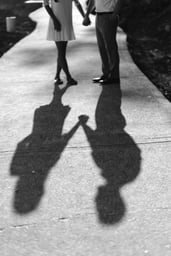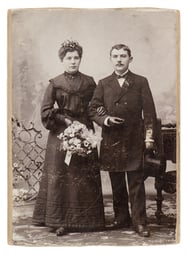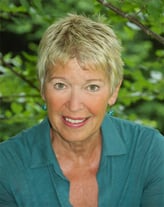Love and Relationships as a Spiritual Path in the 21st Century: A Jungian Perspective. An Interview with Polly Young-Eisendrath. A Guest Post by Bonnie Bright, Ph.D.

Listen to the full audio interview with Polly Young-Eisendrath here (approx. 41 mins)
Personal love—that is, love that we feel within—has changed in the 21st century, according to Jungian analyst, Polly Young-Eisendrath. In this day and age, we seek three very specific outcomes in our relationships that have not always been sought in “traditional” relationships. First, we want relationships that take place between equals, which are reciprocal and mutual. Second, we want to choose whomever we want to love and not be bound to traditions or tribes. Finally, we long to be witnessed by another person who really knows, sees, understands, and hears us.
These three goals have become increasingly present in relationships in the 21st century, making these relationships more difficult to navigate and sustain because everything becomes subject to negotiation, Polly explains. Developing a long-lasting, committed relationship that includes not only companionship, but also friendship, while working to build a family with these three new expectations, can be very challenging. Further, we have become highly invested in choosing a partner with whom we expect we will be wholly witnessed and seen, and if these expectations are not met, it can generate painful personal feelings. It often leads us to believe we cannot remain in such a relationship and still be true to ourselves.
In 1925, Polly notes, C. G. Jung published an essay entitled, “Marriage of the Psychological Relationship,”[1] in which he suggests that as soon as marriages stopped being arranged for us from our own tribe and we decided to choose for ourselves someone outside the tribe who appealed to us, relationships began to change. They began to require more psychological development of the individuals in the relationships, through which they would learn to see themselves and their own propensity for creating projections and disavowing aggressions. If we do not engage psychologically, we are poised to be unhappy and disillusioned.
 Throughout the ages, people have taken vows to stay together until death, through sickness and health. It was not necessarily because they expected they would be the greatest of friends, or that they would serve as witnesses to each other, Polly (who is speaking at the June 2018 conference at Pacifica, "Trauma and Transcendence") reminded me in a recent interview. Rather, it was often so that the family legacy could continue from generation to generation. By extending the family lineage, the original family could pass along their wealth in the form of land or the family business. In this practice, marriage was essentially like a corporation. People entered into it as a contract, and then stayed in it because they “didn't want to be fired,” Polly asserts. These days, however, people pay more attention to personal desire, to whether we feel a marriage suits us, and if we feel we are getting something out of it, personally. The commitment of marriage has changed from being a vow of impersonal loyalty to one of personal loyalty, which requires a whole different set of skills than previously needed, especially for the relationship to continue over time.
Throughout the ages, people have taken vows to stay together until death, through sickness and health. It was not necessarily because they expected they would be the greatest of friends, or that they would serve as witnesses to each other, Polly (who is speaking at the June 2018 conference at Pacifica, "Trauma and Transcendence") reminded me in a recent interview. Rather, it was often so that the family legacy could continue from generation to generation. By extending the family lineage, the original family could pass along their wealth in the form of land or the family business. In this practice, marriage was essentially like a corporation. People entered into it as a contract, and then stayed in it because they “didn't want to be fired,” Polly asserts. These days, however, people pay more attention to personal desire, to whether we feel a marriage suits us, and if we feel we are getting something out of it, personally. The commitment of marriage has changed from being a vow of impersonal loyalty to one of personal loyalty, which requires a whole different set of skills than previously needed, especially for the relationship to continue over time.
Unfortunately, relational trauma can occur when we perceive that the partner we have chosen to witness us is failing us. As the initial idealization that accompanies a new relationship begins to wane, we tend to perceive limitations in the other and find them lacking. This leads to power struggles, followed quickly by projective identification, where both people project all the hurt, rejections, and humiliations that they have never managed to address within themselves onto the other person. Once the other person starts identifying with that image, both parties feel betrayed because the other is simply not showing up in the way that was expected. When each partner looks in the mirror of the other’s eyes, they see a negative image of themselves, which causes a vicious cycle in which each individual is uncomfortable, upset, or defensive. This can continue in a painful way as each individual deals with the most difficult, destructive, and traumatic relational themes they have ever encountered in the past.
Dissatisfaction then leads individuals to see the other as the source of their unhappiness. They can feel betrayed when they feel the other person knows them personally and yet still offends them. In this way, individuals create an “intimate enemy.” In Jungian terminology, this process is the projection of the shadow. However, this scenario also creates the greatest possibility for transformation. As Jung wrote, this process is really the opening to the individuation process for both people.
Many people are struggling in their intimate relationships. Going through the door of chronic projective identification into a renewal of intimacy and love requires several new skills, Polly insists. We have to recognize that we have not created a difficult situation simply because we have chosen the wrong person. Rather, we need to get to a whole new horizon of relating to our partner so we do not resort to massive narcissism and failure. This is what Polly means when she talks about 21st century love between equals, which holds the possibility of transforming our understanding of both self and other.
 Polly is hopeful about love in the 21st century, but she also feels concerned due to the enormity of the challenge we are facing. In her forthcoming book, Love Between Equals: Relationship as a Spiritual Path, Polly details the history of marriage. Before marriage became a legal institution in the Middle Ages, it was only a sacrament. When it did become a legal institution, men were believed to own their wives and children in the same way they owned property, with women taking on the men's names and giving up any property and personal rights of their own. That hierarchical establishment lasted for centuries, and is still the norm in some parts of the world where marriages are still arranged, and couples do not necessarily have a personal relationship between equals.
Polly is hopeful about love in the 21st century, but she also feels concerned due to the enormity of the challenge we are facing. In her forthcoming book, Love Between Equals: Relationship as a Spiritual Path, Polly details the history of marriage. Before marriage became a legal institution in the Middle Ages, it was only a sacrament. When it did become a legal institution, men were believed to own their wives and children in the same way they owned property, with women taking on the men's names and giving up any property and personal rights of their own. That hierarchical establishment lasted for centuries, and is still the norm in some parts of the world where marriages are still arranged, and couples do not necessarily have a personal relationship between equals.
In the West, as culture moved more toward the sanctity of individual rights for many different kinds of people, hierarchies eventually began to shift, as well and more individuals gained access to education, maximizing their options overall. As we increasingly fight for the equality of rights for all individuals, one natural outgrowth is that we long for increased rights in our relationships with our spouses and partners as well. Since marriage is no longer merely for reproduction or for assigning property, it has also opened up in new ways to gay and lesbian individuals and others living alternative lifestyles, causing hierarchical structures in family life to be questioned.
There is something fundamental about having respect for the individual and allowing individuals to have rights, which has now entered into the institution of marriage, Polly maintains. If we look at it from a larger spiritual framework, we might perceive that love between equals allows us to work more closely with consciousness as a relational field.
For Polly, consciousness is a dynamic interactional field between beings, developed through language, religion, ceremonies, art, creativity, and trauma. Trauma, especially, can allow new developments to take place as old structures break down. That dynamic field becomes extremely important to us since we have attachment bonds with the people we love. Since we feel a direct identification with them, we seek to make them happy. Developing new skills like mindfulness about our feelings—that is, being aware on a moment-to-moment basis of what's going on within ourselves and experiencing some kind of containment of our feelings—enables us to feel them before we decide how to express them. Generally, we tend to either discharge feelings before we reflect on them, or else to suppress or repress them. There is a real skill in being able to feel sad without being sad or feel angry without being angry. We also need to develop skills with regards to our ability to speak to each other in a way that cultivates truth and kindness simultaneously, even in the midst of tremendous emotional activation, which occurs naturally in close relationships with family, friends, or partners.
If we are able to develop this new kind of relating, we might be on a new horizon for human consciousness where we would have the ability to deal with conflict without making the other person into an enemy, a concept that has implications for all levels of society. We are not going to bring about tremendous cultural and social changes by legislating language, by telling people what they can say or how they can say it, Polly emphasizes. We can only bring about such openness to difference and to otherness by helping people develop skills like dialogue, mindfulness, and transformation of complexes and difficult habit-patterns in the relationships they care most about.
From a Jungian perspective, psychological complexes (those patterns in our emotions in which we have the habit of seeing ourselves and others in specific fixed ways) are usually organized by our early lives, in our families of origin. Those complexes typically revolve around identity, dependency, or power. From a Buddhist perspective, they can even be karmic, that is, carried over from other lifetimes.
Within these complexes, we have defenses. We need to “bump up against one another” in relationships in order to become conscious—to see the patterns at work in our lives, to understand ourselves, and to define meaning. However, the urge to connect is often offset by the urge for self-protection and feelings of threat. The moment we clash with another person who has a very different view than ours, we have the possibility of breaking down our own entrenched viewpoint and opening the door to a different one. If we can gain perspective by stepping back and observing the strengths and limitations and viewpoints of the other person—especially if we have been deeply entangled with them to the point of wanting to control them—we can begin to feel who we are, to make the proper distinctions, and begin to own some of the projections. As long as we do not destroy trust or destroy the bonds of care for one another in the process, we can transcend our differences. When it is a love between equals, no one has power over anyone else. In this way, consciousness is a relational field, and the dynamics of human awareness can grow through relationship more than they can through any other means, Polly believes.
Some of the larger social issues confronting western cultures relate directly to the kind of inequality that undergirds American society, especially racism, Polly notes. We need a methodology that allows people to deal with these differences without destroying each other's dignity and identity. The solution will come from learning new skills around consciousness and compassion.
Polly, who is a great fan of the singer-songwriter Leonard Cohen, points to his song “Hallelujah,” which she believes provides valuable insight. "Love is not a victory march,” he sings. “It's a cold and it's a broken Hallelujah."[2] In interviews, Cohen has said that love is the reason we're here. It's the way we got here. We were created through love, and it's the way we disappear with each other. Our boundaries go down when we experience love.
From this perspective, Cohen is suggesting that love is an inherently impossible thing to do, and thus it is already broken before you go into it, Polly explains. However, if you recognize that, you can enter into it with more compassion for yourself and others than if you go in with ideals that expect you are going to be a hero, or march through life with the victories of love. That expectation will make you suffer more. Instead, if you know that your heart is going to be “roasted,” then you actually will succeed better in love than if you think that you're going to work everything out with ease. That, Polly believes, is a very big lesson about love. "If you know that it's inherently broken, then you know that it's not the problem of your family, of your partner, or of you. It's the nature of love itself.”
Finding out what love is, is truly a lifelong practice. “Everything that irritates us about others can lead us to an understanding of ourselves,”[3] wrote Jung, also saying, “where love rules, there is no will to power, and where power predominates, love is lacking. The one is the shadow of the other.”[4] Navigating relationships in the 21st century is not easy, but it can be done, and we will all be more conscious if we are truly willing to engage.
[1] Jung’s essay appears in the Collected Works of C.G. Jung, Volume 17: Development of Personality
[2] Lyrics to Leonard Cohen’s song, “Hallelujah” can be found at https://www.google.com/search?q=lyrics+leonard+cohen+hallelujah
[3] Jung, in Memories, Dreams, Reflections. New York, NY: Pantheon. (1963).
[4] Jung, from the Collected Works of C. G. Jung, Volume 7: Two Essays in Analytical Psychology. Princeton, NJ: Princeton University Press. (1966).
Learn more the upcoming conference, “Trauma and Transcendence: Depth Psychology, Spirituality, and the Sacred,” taking place June 22-24, 2018.
Learn more about Polly Young-Eisendrath on her website at https://young-eisendrath.com.
 Polly Young-Eisendrath, Ph.D., is a Jungian analyst, psychologist, and author. She is a Clinical Associate Professor of Psychiatry at the University of Vermont; Founder and Director of Institute for Dialogue Therapy; and in private practice in central Vermont. She is also chairperson of the non-profit “Enlightening Conversations: Buddhism and Psychoanalysis Meeting in Person". Polly has published many chapters and articles, as well as sixteen books that have been translated into twenty languages. Her most recent books are The Present Heart: A Memoir of Love, Loss and Discovery (Rodale, 2014); The Self-Esteem Trap: Raising Confident and Compassionate Kids in an Age of Self-Importance (Little, Brown, 2008); and The Cambridge Companion to Jung: New and Revised, of which she is co-editor with Terence Dawson (Cambridge University Press, 2008). Polly’s forthcoming book, Love Between Equals: Relationship as a Spiritual Path, will be published in 2018.
Polly Young-Eisendrath, Ph.D., is a Jungian analyst, psychologist, and author. She is a Clinical Associate Professor of Psychiatry at the University of Vermont; Founder and Director of Institute for Dialogue Therapy; and in private practice in central Vermont. She is also chairperson of the non-profit “Enlightening Conversations: Buddhism and Psychoanalysis Meeting in Person". Polly has published many chapters and articles, as well as sixteen books that have been translated into twenty languages. Her most recent books are The Present Heart: A Memoir of Love, Loss and Discovery (Rodale, 2014); The Self-Esteem Trap: Raising Confident and Compassionate Kids in an Age of Self-Importance (Little, Brown, 2008); and The Cambridge Companion to Jung: New and Revised, of which she is co-editor with Terence Dawson (Cambridge University Press, 2008). Polly’s forthcoming book, Love Between Equals: Relationship as a Spiritual Path, will be published in 2018.

Bonnie Bright, Ph.D., earned her doctorate in Depth Psychology at Pacifica Graduate Institute. She is the founder of Depth Psychology Alliance, a free online community for everyone interested in depth psychologies, and of DepthList.com, a free-to-search database of Jungian and depth psychology-oriented practitioners. She is also the creator and executive editor of Depth Insights, a semi-annual scholarly journal, and regularly produces audio and video interviews on depth psychological topics. Bright is especially interested in ecopsychology, dream work, and divination, and has completed 2-year certifications in Archetypal Pattern Analysis via the Assisi Institute and in Indigenous African Spiritual Technologies with West African elder Malidoma Somé. She has also trained extensively in Holotropic Breathwork™ and the Enneagram.



